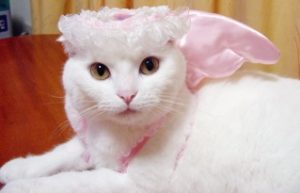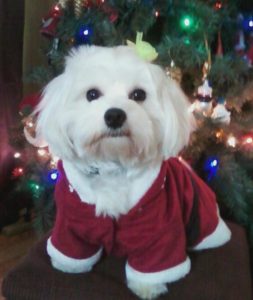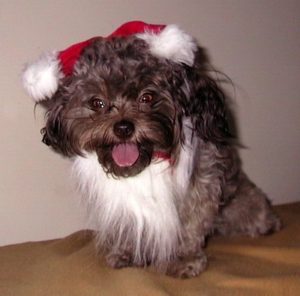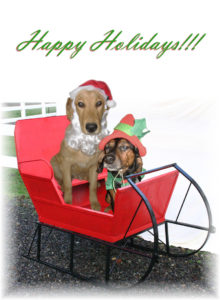 Would it surprise you to learn that I was once an angel? For those considering renouncing your faith if the likes of me can achieve such status, permit to add that this occurred when I was in the second grade. And I’m sure it only happened because I happened to have access to a kick-butt angel costume.
Would it surprise you to learn that I was once an angel? For those considering renouncing your faith if the likes of me can achieve such status, permit to add that this occurred when I was in the second grade. And I’m sure it only happened because I happened to have access to a kick-butt angel costume.
It happened like this. My grandmother and Aunt Hilda were seamstresses of haute couture quality who lived in the same house and often collaborated on projects. Skirts, dresses, suits, gowns: nothing daunted them. I don’t remember who they originally made the angel costume for, but I suspect it was for Aunt Hilda’s daughter the eldest of my many cousins. The costume was a work of art. The pale yellow robe was high-end angel garb by any standard. But the halo and especially the wings were to die for. To this day I can’t comprehend how they managed to make wings so big and light they surely made Gabriel green with envy.
My cousin wowed them in a church pageant and I think my sister carried on the tradition a few years later. I, on the other hand, landed the angel role in one of those potpourri school pageants, most likely because giving it to me meant one less costume to worry about. But for me, it also beat being one of the sheep. On the other hand, it also meant I had to—gulp—recite an angelic speech.
As I waited to go on, what little confidence I possessed slowly oozed out of me. The low point came when Mary and Joseph knocked on the door to the inn and the innkeeper couldn’t open it because it was stuck. Mary and Joseph started pounding on the door and shouting, the innkeeper shouted back, and the parents in the audience all chuckled heartily. The art teacher raced out of the classroom and down the hall to the Mary-Joseph side of the little-used door. Once there, he put his full weight against it. In his enthusiasm to save the day, he apparently forgot that the amount of force necessary to open a door that two second-graders hampered by flowing robes couldn’t probably was a lot less than that applied by a large adult male bi-ped.
The door exploded inwardly, and the innkeeper screamed and leaped back in shock as Mary, Joseph, and the art teacher tumbled into the room. Meanwhile parents struggled to stay on their little kids’ chairs while laughing. I stood in the wings with the three wise men and assorted sheep knowing that this would be a very tough act to follow. While Mary, Joseph, and the innkeeper sorted things out, I mentally went over my speech. Or rather I tried to, but by then I was so rattled I couldn’t get past the first line. Luckily for me it was a good first line and one that remains more powerful than ever this holiday season.
Do not be afraid.
In the decades since that infamous school play and 16 years since I wrote the first commentary that launched this site, we’ve become an increasingly fearful society. In the process of facing the  same fears that have plagued humans for ages—war, poverty, illness—our companion animals have become more important to us than ever. Because of this, we must add the fear of something bad happening to them to all our fears for ourselves. If those animals have close relationships with us, chances are they’ll pick up on our distress. If they feel as unable to cope with it as we do, it may negatively affect their health and behavior, too.
same fears that have plagued humans for ages—war, poverty, illness—our companion animals have become more important to us than ever. Because of this, we must add the fear of something bad happening to them to all our fears for ourselves. If those animals have close relationships with us, chances are they’ll pick up on our distress. If they feel as unable to cope with it as we do, it may negatively affect their health and behavior, too.
It seems to me that fear acts a lot like a stuck door. We hate it enough that we carry on ranting and raging and impotently try to push it away from us like a bunch of second-graders dressed in retrofitted bathrobes trying to pretend we’re grown-ups. And very special grown-ups at that. And like those little kids, we yearn for some big strong type to come along and bash through it, even if it means that any consequences may be worse than if we’d just had a little more patience and tried a little harder to figure things out for ourselves.
Dealing with the fear brings me back to that frazzled angel with the kick-butt wings watching the debacle, fearing she would precipitate another one. Once Mary, Joseph and the innkeeper staggered off amid great applause, the shepherds, sheep, and I trickled in. When the shepherds dropped to their knees and looked up at me in what was supposed to be awe but to me looked more like horror, I blurted out the first thing that came into my head, “DO NOT B E AFRAID!”
And then I froze, unable to remember my next line. In that instant, I automatically looked at my mom and read her lips as well as her eyes: Do not be afraid. “For behold I bring you good tidings…” I didn’t need the rest of it. Her confidence washed over me, the fear vanished, and I was off and running, so fast it sounded like I was auctioning sheep and shepherds instead of enlightening them. But I didn’t care because, thanks to my mom, I was no longer afraid.
 So what does this have to do with the human-animal bond, let alone holiday cheer? Because domestication kind of suspends animals in a physiologically and behaviorally immature state, it primes dogs, cats, horses and other domestic animals to relate to us as mature adults of their own species. Whereas those who parent human offspring must care enough to recognize the special needs of toddlers, young kids, adolescents and teenagers, those of us with animals must recognize our animals’ particular species’ needs in addition to all of those life-stage ones. Like my mom, we need to be there for our animals when they’re frightened, communicate our confidence in ourselves as well as them, and cue them regarding the right response.
So what does this have to do with the human-animal bond, let alone holiday cheer? Because domestication kind of suspends animals in a physiologically and behaviorally immature state, it primes dogs, cats, horses and other domestic animals to relate to us as mature adults of their own species. Whereas those who parent human offspring must care enough to recognize the special needs of toddlers, young kids, adolescents and teenagers, those of us with animals must recognize our animals’ particular species’ needs in addition to all of those life-stage ones. Like my mom, we need to be there for our animals when they’re frightened, communicate our confidence in ourselves as well as them, and cue them regarding the right response.
Years later when I had young kids of my own, I asked my mom what went through her mind when I forgot the words of my speech in front of all those people. Her answer shocked me: I was so afraid for you. But she was equally determined that I’d never know it, even if she had to fake a confidence she didn’t feel… which she did. And then I initially did the same. But somewhere along the way, that fake confidence became real for both of us because we had so much faith in each other.
Hippocrates said that faith, not the physician nor the treatment, claims the top role in the healing process. I second that and add that it claims that same position when it comes to maintaining a quality bond with another being of any species. Just as our kids force us to deal with fears for them and ourselves that we might not otherwise, so do our animals. Thanks to each other, we get to open doors ourselves that neither of us might be able to open otherwise.
As far as good wishes for the holiday season go, wishing you all that kind of bond with your animals is one of the best.

Spot on, as usual. XO